Issue Number 6, Autumn 2009
Contents
- Diving by Marie-Elizabeth Mali
- Enough by Elizabeth Kerlikowski
- Feather Falls by Tom Goff
- Forest Giraffe (Okapia johnstoni) by Amanda Sandos
- Gifts by Julian Hoffman
- Love by Alicia Ostriker
- Somewhere Near Amritsar by Gail Ghai
- The Initiation by Therese Halscheid
- The Road Between Them by Gary Cooke
- What Happened in August by Christina Pacosz
- What is Your Personal Connection to the Ocean? by Mary Krane Derr
- You Came Back East by Kimberly L. Becker
Archives: by Issue | by Author Name
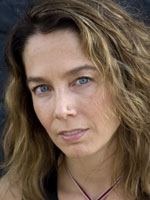
Diving
by Marie-Elizabeth Mali
Marie-Elizabeth lives on Manhattan schist between the East and Hudson rivers.

In this underwater world with its lobed and convoluted coral,
ferns that sway beside fields of garden eels, I float
toward a swath of barren coral, no fish around, and ask myself,
how long before this sand is all that’s left?
Back home, I clip lilacs, their scent diffusing through the room,
marvel at the first open peony, its heady perfume,
and decide to leave it in the garden with the irises and lilies,
all planted by the previous owners, his blindness—
second brain tumor at 36—forcing them to sell
the home they’d built to live in all their lives.
Most days I long for perfection, for everyone to be safe.
Maybe the only perfect thing in life is longing.
Praise this beautiful, terrible world where we are opened
and crushed, where the kiss comes from the mouth that bites.
© Marie-Elizabeth Mali
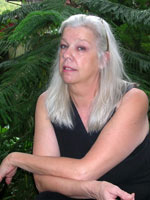
Enough
by Elizabeth Kerlikowski
Elizabeth lives in a spruce paradise between Asylum Lake and Woods Lake within Kalamazoo's city limits.

The disappointment of a thunderstorm
is that the lights may not go out
There may not be enough power in the sky
to plunge us into the darkness we crave and fear
The wind must howl the shingles off the roof
Rains cascade onto windshields
forcing traffic to its shoulders
Lightning snaps from transformers
a gray blue green landscape of electricity
Trees kneel in the road
and weather gnaws at the back door
What if there were no deafening sky fights
No house-shuddering cataclysms
How would the animals breathing inside
know they had survived
What if there is nothing
we can’t control
© Elizabeth Kerlikowski

Feather Falls
by Tom Goff
Tom lives in the Lower American River watershed northeast of the Sacramento River delta.

We opt for the shorter, steeper trail
to the waterfall. Our legs and backs
burn all the way for our choice,
swigs of water, gobbets of food
assuaging the ache. Pine aroma, manzanita’s
reddish black twists under soft green,
redbud’s astonishing violet sprigs,
and Indian Paintbrush in concert salve
the granite-and-white-dust glare. We trudge
towards the waters’ echoes as soldiers guide
on the gunblast: Frey Creek,
the Middle Fork of the Feather
turquoise and slow in its green-tufted ravine
(our view from aloft sees only the largo
truth of the current). Then, revealed at last,
the Fall River plummets daggerwise
to the crash of the gorge: fell, maniacal;
sublime, Burke would tell us,
in its terrors. Granite and basalt
shoulders direct the eternal outpour,
water upon water, and, in the heart
of the ablution, plume after plume:
this many-foliate Heraclitan arrow,
feathered to shoot god-straight,
explodes boulder all about us
to rainbow, pine duff, and nymph-slender
lavender butterfly; food
a great weariness desperately needs.
Reprinted from Sinfonietta by Tom Goff ( Rattlesnake Press, 2009)
© Tom Goff
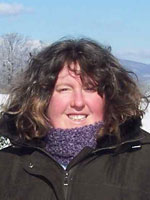
Forest Giraffe (Okapia johnstoni)
by Amanda Sandos
Amanda lives on a hundred-acre farm nestled between the Blue Ridge Mountains Peaks of Otter and the James River in the Blackwater Creek watershed.

Oxygen-thin air grows heavy, drips down
velvet fern fronds. Fat dollops condense on stems;
drop onto a mattress of leafy loam, beside pebbles
of his dung. Birds, frogs, mosquitoes, trees creak and sing,
none disturbed by the silent Okapi moving
through the thick Ituri brush. With a burgundy coat oiled
by skin and scent glands, he slips beneath the sleeping
leopard who, dreaming of the evening hunt, never
twitches his keen ears. Today, the black cat dines
on dung beetles and Barbet birds.
The Okapi stops, wraps a prehensile tongue
around teak stems, stripping them bare,
quietly chewing, on his hike toward the Congolese
River. Skin-covered horns separate the wall of vines
at the bank. One striped leg and a head lean
out of the underbrush, observed only by Bichir fish
that scatter when his shadow slides over. His long
purple tongue laps flowing water sponged
by dangling roots of a strangler fig ficus,
its slick bark shining with lichens. Clouds crack
and spill. Bromeliads rest in the crooks catching pools
of rain. Bearded Barbets sip from rising
water, fly when it spills down the tree. Below,
the Okapi retreats into the underbrush, shaking
droplets off his hide. He steps over dung, glides
to his nightly nest, stands surrounded by green
spirals of ginger, beside bulging buttresses
of mahogany, sheltered by massive leaves
of a climbing elephant ear vine.
He ruminates, chewing and swallowing
what was coaxed from the thin soil
by another day of rain.
© Amanda Sandos

Gifts
by Julian Hoffman
Julian lives above Great Prespa Lake in a mountain valley in the southern Balkans.

The ancients named them the halcyon days, the irrepressible interlude. They arrive in the depths of winter like an unexpected friend, and for an unseasonable week or so a radiant warmth spills over the land. The hours swell with the prospects of spring, the luxurious light notching smiles on the most reluctant of faces. The days then slip out like a wistful sigh, fading as quietly as they came, and winter stills the land again.
The brazen warmth jostles the senses while it stays, upending occupations. There is an immediate change in the air: the hum of rural industry. The tree sparrows prepare nests with gathered chaff; onions are buried up to their shoulders in hastily dug plots; woodlarks spiral high to sing their elusive songs, as if liquid were tumbling from nowhere; and rugs are hung to air like an embroidered gallery. Villagers use sickles to sharpen the fat ends of canes, ready to be sunk into summer gardens for climbing beans. A wall lizard clambers over the old beehive; it is smaller than my smallest finger yet as eager for warmth as I.
The true expressions of spring, though, are few. The trees and meadows are pale with winter, as washed out as a found photograph. The hillsides are sparse, and ice still guards the river-edge. The halcyon days are a conjurer’s season – a sleight of hand or trick of the light – but no less exuberant for their false promise. In their convivial company you would be forgiven for thinking the end of winter was near, that it was safe to sow tender plants and clean out the wood stove, but that would be mistaking their significance. Rather, it is a time of gifts and small miracles - a brief brumal dance between storms.
The morning was already warm when we set off to climb a mountain near our home in northern Greece. We followed logging tracks, some still decked with snow, which corkscrewed through dense forest. It was like swerving along a border, in and out of time. The dark valley clefts and shaded woods were still winter-cold, where only a thin frosted light slipped through the lacework of branches, but when we stepped into a clearing, or along a sunward ridge, we were welcomed into spring like a shared celebration. A drowsy southern wind raked the leaves around us, and stubble fires smoldered on the plain below – the coils of smoke lifting like a kettle of cranes.
A few butterflies swooned in the sun: a red admiral wheeled above a reef of leaves; a peacock shyly showed its colors, as if uncertain of its claim; a tortoiseshell festooned a stone. It was their first warmth in months and they swam in it, draping their myriad designs over the pale places of winter. Around the bend fresh bear tracks crept past us in the crusted snow.
We found the fire salamander in a water tank whose cover had come away. It must have slipped on the stone lip and drowned beneath the fall of water when it couldn’t climb out. Its orange spots floated like fireflies in the dark depths.
The tank collected spring water to supply a village below, and my partner suggested removing the salamander. We looked for something to lift it with, unsure if its skin secretions were still harmful. The beech and oak leaves that surrounded us were too small, but a single maple leaf lay conspicuously near, as though its autumn arc had been intended.
It took three tries to scoop the dead salamander from the swirling water. I cradled it on the makeshift raft; its black skin glistened like oil, tear-dropped with bright flames. A foreleg trembled involuntarily, as if shaking the last of the water off. Then a back leg stuttered forward, followed by the foreleg again. We set it down with a sudden rush of joy. The moment of wonder had been unexpected, a keepsake in the season of gifts. For a few minutes the salamander delicately remembered its limbs, before ambling off with a twirl of its tail into a drift of damp leaves.
On our way down the mountain we heard woodpeckers drumming from the woods. Yellow crocuses had crested the soil to flower in the fugitive light. We walked the last of the valley in wintry shade, knowing the crocuses would soon quiver with cold, or be lost beneath snow. But for now they blazed like a hillside of rare suns.
© Julian Hoffman
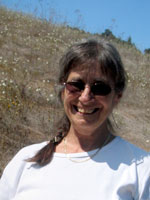
Love
by Alicia Ostriker
Alicia lives in Manhattan Valley, formed by an east-west slash in the granite bedrock that goes downhill from Central Park west to the Hudson River. A stream once flowed down it; now wind from the river funnels up.

Too late for mating season
what is the cardinal doing
all week flying between
the feeder outside my kitchen
and the hedge by the brick wall
where a female or is it a juvenile
waits with needy beak open
yellow-pink inside--not cheeping but
vibrating its wings so fast
they blur like a hummingbird’s
it’s the same thing
girls do with their eyelashes
the adult male pecks some seed
for himself then gracefully swoops
to the brown one’s low branch
and feeds her
and gets some for himself
and feeds her again
all week
I am almost getting stoned
just from watching
Author Photo by Amy Meier
© Alicia Ostriker
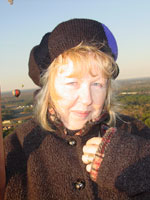
Somewhere Near Amritsar
by Gail Ghai
Gail lives in the Sarasota Bay watershed on the eastern shore of the Gulf of Mexico.

Somewhere near Amritsar
the Delhi Express slows
as pools of brown monsoon
rain have come late like
a promise, have inundated these lush
Punjabi fields, sculpted the banks of
the train tracks with sand bags and
delays, reminding us there is a god
in the smallest element. Keep in mind,
ivy can crumble stone, a cobra can kill
a king, and water is a lord. He can
shower or rinse away our lives.
© Gail Ghai
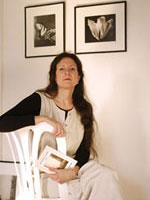
The Initiation
by Therese Halscheid
Therese was raised near a prehistoric pond where the first dinosaur bones were unearthed in North America.

It was frightening
to grow calm lying down and yet not know
what sleep held
what the mind of wild trees
might do
black snakes, the alligator
I spotted earlier
in the swamp, anything was possible
already,
I witnessed areas
with no wind and flickering leaves
I had found shadows freeing themselves
enough to come alive
and when, by middle night, a presence
came through the screen, something that
took no form but moved
curiously forward
I, I
who had come this far
to be torn from the civilized world
knew only how to be good to it, was good
to it in opening myself, my limbs
as a woman might
and allowed its power to fall over me
learning, as one’s eyes will do
entering words on a page.
I was read that way
and then,
in a manner which meant acceptance
felt gently closed like a book,
as it left.
Reprinted from Uncommon Geography by Therese Halscheid
© Therese Halscheid

The Road Between Them
by Gary Cooke
Gary lives at the edge of the Texas Hill Country in the Lower Colorado-Cummins Watershed near Gilleland Creek.

This kind of country
makes your heart spill.
Wildflowers everywhere,
a sign saying
Sweet Medicine Ranch.
Just below Latrobe
the dark eyes of a mare
disturb you, until the curve
in the road lets you see the horse
on the other side, head down
in the long grass.
The road between them
wet and dark, a sky purple
with thunder, you feel something like love,
even driving by,
big drops of rain splashing
like tears on the windshield.
Reprinted from Yuba Flows (Hip Pocket Press, 2007)
© Gary Cooke

What Happened in August
by Christina Pacosz
Christina lives near the Kansas and Missouri Rivers below a limestone ridge in a highly-managed urban watershed.

A cold woosh of air from the north brings gray skies and rain today.
The merlin we saw perched on the power line between the cabin and the outhouse yesterday was back again this morning. I watched it hunt a rabbit hunched in a patch of fireweed, scant cover now the bloom is gone. The small falcon flew away, talons empty.
A thin squirrel was rummaging for cookout scraps on the back porch, peering in the window while I made a phone call. Food seems to be the imperative now and I regret another summer without a garden, but the mosquitoes deterred me. The wild berries I have picked are disappointingly bitter. We own no gun to hunt moose and no truck or chainsaw to gather wood. We call ourselves grasshoppers and laugh. Last night we spotted our first flock of geese heading south.The inexorable winter bearing down.
* * *
Last Sunday in Denali was magical. An overused adjective, but accurate for summing up the day's events. The details would branch into many stories, each one of us on the park bus strangers with tales to tell.
My story might go something like this:
After a careening drive down the steepest gravel road I have ever traveled, the bus tires inching perilously close to the crumbling edge of sheer cliffs, the relief of the river. Safety at last.
We halt to witness a pair of wolves fighting two grizzly bears over a caribou carcass. Up and down the bus, speculation as to who killed the caribou or made the lucky find favors the wolves, then the bears, and back again.
The wolves are definitely the losers now, though they do not slink far. One of the bears bests the other, who leaps up the cliff into the forest, scattering rock in its scramble to get away. The winner grapples with the caribou, a mock kill; its claws leave red gashes. Mine.
A red and black fox with a white-tipped tail moves in for the long wait. A flock of magpies settles in the trees.
The wolves are patient as rocks on the riverbank. The color of their fur and their utter stillness conspire against us, and we lose sight of them, only to fix them again in our binoculars and cameras, our technological eyes, and our naked ones, too. There is a conspiracy of stones and wolves against us. I am simultaneously enthralled and vexed by such lupine trickery.
The grizzly's bulk plows a wide furrow in the river; the yellow-eyed stare of the wolves must go. The pair retreats several yards, cringing, tails between their legs. The bear rushes them one more time, but canis lupus will not give up the vigil. The meat is there for the taking. The wait does not worry them; their lives are a long search for food. Or not. In the meantime, the sun is hot and so are the rocks.
One wolf sports a green radio collar. Adolph Murie's legacy at work in the ongoing scientific scrutiny of the current members of the East Fork wolf pack. The collar makes the wild appear tame, but this is not a domestic scrap; the backyard we are in is wild country.
I scan the distant flats where the river disappears in ribbons of silver and spot a sow and three cubs running behind her. Triplets! She's headed in the direction of blood and meat, and without hesitating swims the river. The cubs scramble to a large, flat rock near shore. Laughter at the picture of three little bears in a row is universal. The human mothers on the bus murmur approval of such strategy.
The sow lunges at the bear who thinks the caribou is his and their fight is loud and long. Blond fur rippling black, the grizzlies stand upright in the white rapids. The guttural roar of ursus horribilis is like something ripping deep inside the body of earth. The bears swing huge paws at each other, their stances reminiscent of human prizefighters in a ring.
We are instantly transformed into petitioners, whispering: Don't fight and Don't lose. Please for the mother whose children wait nearby. Fresh meat?
A hiker is coming down the path above it all, converging on this singular spot, at this particular time, and seeing the gestures of those below, halts. We are a strange tribe, but he is one of us and recognizes what our hands and bodies are trying to tell him: Go back. By then he hears the roaring himself and needs no warning. I wonder how far he must flee before the terrible sound stops.
One grizzly is the winner, of course. This is not a battle to the death, or any foolish romantics, but knowing how to use just enough power to win, or lose, and run away, no hard feelings. Something animals do and humans all too often do not.
The winner chases the loser onto the gravel bar where the wolves are sprawled. Without flexing a muscle, their posture proclaims, These bears are a rowdy lot.
After a quick nose nuzzle with each of her children, the sow pivots and swims the river at the swiftest spot. A collective sigh of relief sweeps the bus at this briefest of family reunions. The cubs do not follow, but watch intently as their mother fights the current. Before her paws touch bottom, she bats at the carcass, half-in, half-out of water. Hers now.
* * *
Despite the buzz of conversation, what we are seeing is not an episode of Wild Kingdom. Marlon Perkins will not narrate, though our bus driver bears some resemblance to the television host, and swears he's never seen anything like this in the twenty years he's worked the crowds and roads. It is not, even as he attempts to sum it up, The law of the jungle.
No, what we are watching is not television or the movies. And certainly not Saturday morning cartoons, though a few of the children are bored with the bears, the invisible wolves, and voice their desire for a TV to turn on. I mourn the death of imagination in them, for this glimpse of the mystery is an honor, a rare and precious gift. How else to say it?
The story will be told as adventure, comedy, tragedy, the drama milked for all it's worth. Isn't that our way?
Our arrogance.
* * *
The bus lurches off. This is a tour after all. We have lives to live elsewhere: our tents, motor homes, our waterless cabins, and expensive hotels. The story, the driver tells us, will go on for days in that bend of the East Fork.
What we were so blessed to witness at Denali is being written anew. Who has the carcass in its jaws now?
Has Wolf snatched a bite? Did Magpie dart from the trees to feed when Bear wasn't looking? Or is the flock still waiting patiently like the wolves? Did the Three Little Bears ever get a taste of Caribou, or has big Goldilocks gobbled it all? What about that Sly Fox? Did it finally manage to swallow even a morsel?
Where was Raven? Did he steal the show when he finally arrived?
* * *
Ice cold, turquoise water bathes battered caribou flesh.
Spruce, gray and stunted, shudder in the wind. Birch glint gold in the diminishing light of approaching winter.
The river waits for the bones.
© Christina Pacosz
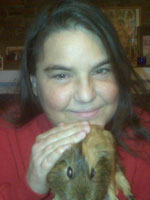
What is Your Personal Connection to the Ocean?
by Mary Krane Derr
Mary lives down the block from a sandy-soiled community garden near astounding tons of old glacial melt, namely Lake Michigan.

Birthed out my mother's small
upside-down chalice of it,
I ran down and down to the Sea
to keep on hearing it waving
without fail, through selfsame
saltwater, the Great Great
Original Heartbeat, a pregnant woman’s
drummed to some billionth power.
© Mary Krane Derr
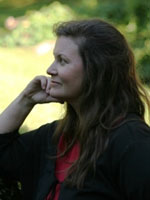
You Came Back East
by Kimberly L. Becker
Kimberly lives near the Great Falls of the Potomac River, a series of cascades and white water rapids above the Chesapeake Bay in the Middle Potomac-Anacostia-Occoquan and Catoctin watersheds.

You came back East,
declared the leaves a disappointment.
I concurred, apologizing like a guide
for the underwhelming show.
But just this morning
the wet and mottled motley
of the maple reminded me
of what I should have known.
The leaves averred that change is hard:
Climate conspires
to make it difficult to die.
Filled with chlorophyll
we wait for chill that never comes
or comes too late for us to peak
in the orange, red, yellows that you seek.
© Kimberly L. Becker